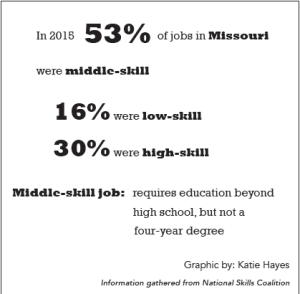Majority of U.S. jobs require less than a bachelor’s degree
By: Katie Hayes
Editor-in-Chief
Like many St. Louis Community College (STLCC) students, Dallas Isom did not want to take general transfer courses.
“I didn’t like the classes I was taking,” Isom said. “I didn’t know anybody. I mean, it was horrible. I didn’t even know what I could do with a mechanical engineering degree, so I actually dropped out after my first semester and took a semester off because I didn’t know what I was doing and I hated it.”
Isom is set to graduate this spring with an associate in applied science degree in automotive technology. After trying general education courses at STLCC, Isom left for a semester before beginning the program in fall 2015.
“I’ve always kind of known that I like cars and I wanted to get into the automotive field with the mechanical engineering degree,” Isom said. “Then I found out that our school has an automotive program so I decided to try it and I went back to school in the fall and have loved it ever since.”
More than half of Missouri’s labor market is composed of “middle-skill” jobs according to the National Skills Coalition. Middle-skill jobs are jobs that require more education than a high school degree, but less than a bachelor’s degree.
“What a lot of people don’t know is that middle-skill jobs are the fastest-growing jobs — compared to high-skill jobs and low-skill jobs,” said Stephen Long, associate vice chancellor for workforce solutions at STLCC. “In the middle-skill jobs, there are actually more jobs than workers. So that’s where the gap between jobs and workers is, and I think that’s what a lot of people don’t understand.”
Traditionally, STLCC focuses on training students for the workforce. The State of St. Louis Workforce 2016 report discussed three main areas — healthcare, manufacturing and transportation & logistics.
“We use the information to help us shape our programs, but also to help the rest of the community,” Long said. “The report is fairly general in some ways. We talk about major skill shortages. We also look at occupations that are in high demand.”
The St. Louis Missouri-Illinois Metropolitan Statistical Area (MSA) has a labor force of nearly 1.4 million. According to the State of St. Louis Workforce report the unemployment rate in the St. Louis MSA dropped from 5.4 percent in 2015 to 4.5 percent in the same month in 2016 and it seems the national and regional economies have fully recovered.
“One thing the report found is the shortage of workers with knowledge and skills is the barrier for employers expanding their workforce,” Long said. “The economy is getting good, but [employers] can’t find all the workers they need.”
On March 9, all 12 of Missouri’s community colleges established the Missouri Community College Workforce Development Network. This network connects the community colleges and, essentially the resources they possess, to work toward filling Missouri’s workforce need.
This change came in response to proposed budget cuts for fiscal year 2018, which would cut funds for community colleges more than 9 percent and workforce training by roughly 16 percent according to an email sent to STLCC employees from Chancellor Jeff Pittman. However, at the Board of Trustees meeting on February 23, Pittman said he wants to keep tuition affordable because STLCC is the “pathway to the middle class.”
After two months in the automotive technology program, Isom’s instructor helped him find employment at Weber Chevrolet.
“I got the job with zero automotive experience whatsoever,” Isom said. “It was an introductory job to just get me experience in the field and I was changing oil on Chevy cars all day, every day.”
Isom said he is moving up at Weber Chevrolet and now does car inspections.
“I’ve learned so much at school that I didn’t know about cars,” Isom said. “They really gave me the best kind of base to start with, but for me to get better at my job doing it is the only way to improve, you know. The cars that I see at work are the same cars every day pretty much. You get used to working on them, you get used to how they work.”
Isom plans to work at Weber Chevrolet after he graduates.
“They already offered me a job so I’m already set up,” Isom said. “It’s a union job, it’s got healthcare benefits, 401(k), whole nine yards. So, I go to work there every day and just fix cars. I don’t know. I would like to have a family and my own house and stuff, but it’s a stable, reliable job — nice place to be.”











